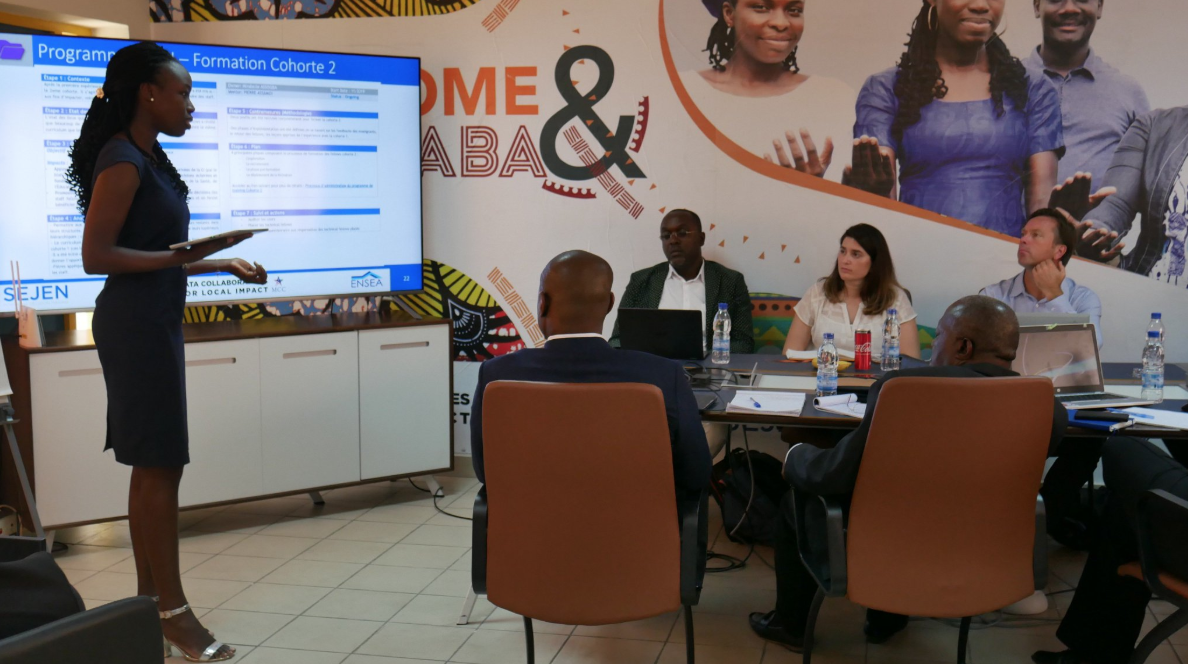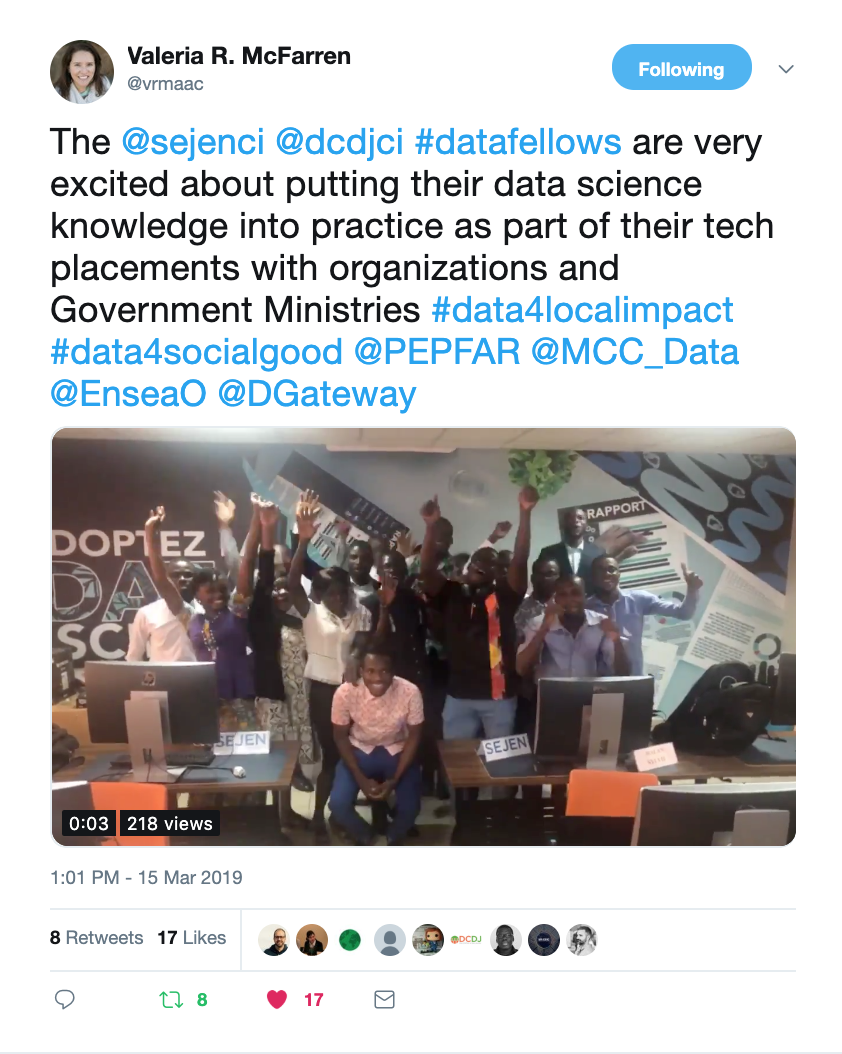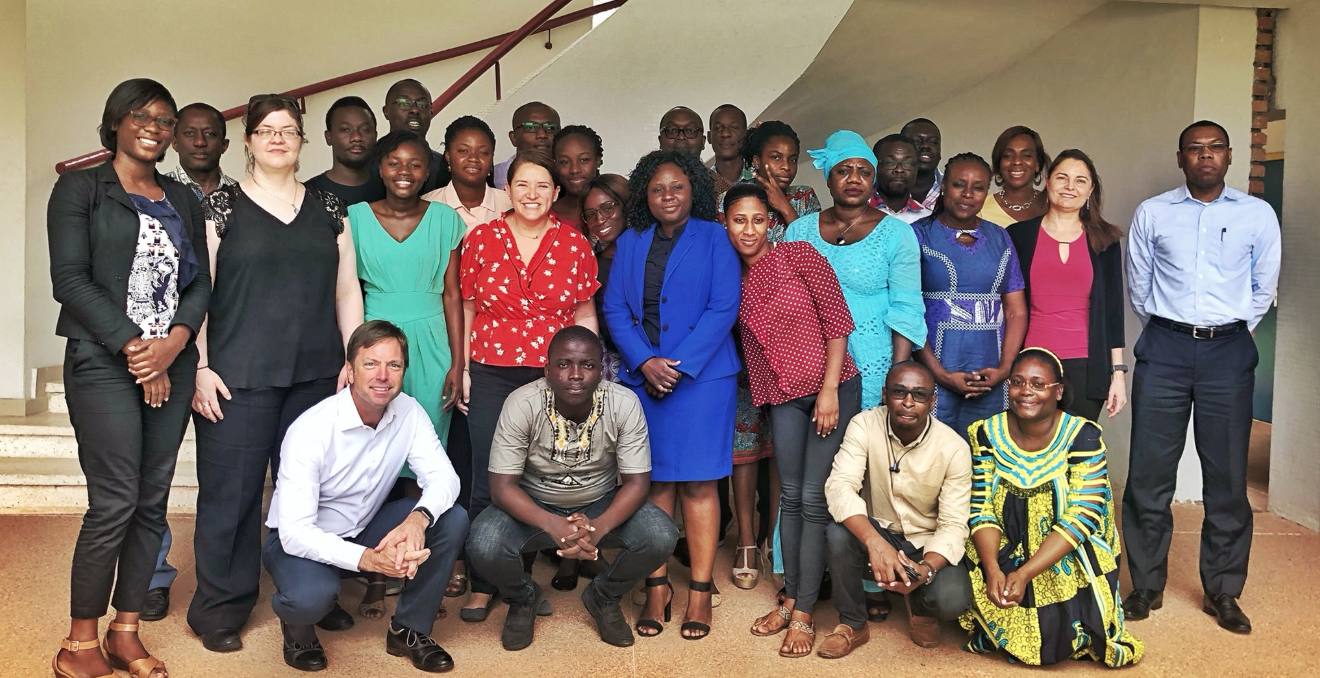Flashback to the Des Chiffres et des Jeunes Semi-Annual Review (SAR) / Retour sur le Semi-Annual Review (SAR)
This post was written by Marie-Claude Zando, Chief of Party of the DCDJ Program, and Emily Fung. Ce blog est également disponible en francais ci-dessous.
Last month (March 13-19, 2019), the Millennium Challenge Corporation (MCC), Des Chiffres et des Jeunes (DCDJ), and SEJEN teams gathered at the Ecole Nationale de Statistiques et d’Economie Appliquée (ENSEA) campus for a comprehensive Semi-Annual Review (SAR) of activities carried out since the DCDJ project launched. They were joined by the project’s local and international NGO partners – health-focused COSCI, Ivorian youth-focused Fondacion Performances Societales (FPS), and DG’s long time partner SBC4D.
Throughout the productive week of review, different project teams presented their findings, received feedback, and participated in collaborative working sessions with MCC.
In a friendly yet studious atmosphere, this bi-annual meeting provided a space for staff members across project partners to build relationships, outline lessons learned so far, and share best practices to help ensure continued DCDJ success.

Figure 1: Presenting the framing for Cohort 2 of the DCDJ Fellowship Program
As a data-driven community, we know how critical sharing and articulating of results is for project sustainability. The SAR was an opportunity for the SEJEN and DCDJ teams to share results, articulate lessons we’ve learned – and will continue to learn – and explain how funds allocated from PEPFAR have been managed.
The DCDJ team presented on the following:
- Progress review of the Open Data Readiness Assessment (ODRA) currently being conducted, with a presentation from Mr. Stéphane Boyera of SBC4D;
- Overview of how DCDJ is aiming to ensure current data ecosystems meet local community needs through our ongoing subnational engagement, building partnerships in subnational target regions Daloa, San Pedro, and Man;
- Overarching presentation of results achieved so far, M&E activities undertaken, and the action plan and project communication strategy for the next 6 months.
The SAR also provided a valuable touchpoint for the MCC team to interact with the 1st Cohort of Technical Fellows.

The 1st Cohort of Fellows has successfully graduated from the DCDJ Fellows program, and has brought data analysis knowledge gained to job placements in various institutions (including the National Program of the Fight Against Aids, the Direction of Technologies and IS at the Ministry of Education, and the National Program for the Promotion of Traditional Medicine). After the Fellows presented and shared their personal and professional growth stories, they left with congratulations and encouragement from the MCC team.
Such a unique opportunity for the Fellows to receive direct feedback from program leaders, and be recognized for dedication to raising awareness of the importance of data use for decision making, has been valuable to each Fellow.

Figure 2: Cohort 1 of DCDJ Fellows with members of the MCC Team
Additionally, the Deputy Director of the Digital Strategy of the CIE (the National Electric Company) attended the SAR, presenting his thoughts on integrating data science within CIE. In building attendees’ knowledge of how data science is used within another sphere, he brought further light to how universally beneficial data use is – and how broadly critical DCDJ’s objectives are.
As the SAR ended, initial feedback and recommendations were provided to each team. Recent performance improvements and staff onboarding within both DCDJ and SEJEN teams were received positively. Additionally, MCC urged both teams to continue their efforts towards the goal of contributing to the supply of reliable data for better decision making in Côte d’Ivoire.
As the DCDJ team, we renew our thanks to all SAR participants, and we look forward to seeing you in 6 months for SAR 3!
__________________________________
Retour sur le Semi-Annual Review (SAR) 2 – Mars 2019
Millenium Challenge Corporation (MCC), les équipes DCDJ et SEJEN ainsi que les ONG partenaires – Development Gateway, COSCI, FPS et SBC4D – se sont rencontrés du 13 au 19 Mars 2019 au sein de l’ENSEA pour un bilan des actions réalisées depuis le lancement du projet Des Chiffres et Des Jeunes.
Dans une ambiance conviviale mais studieuse, cette rencontre semestrielle a permis aux différents staffs de faire plus ample connaissance et partager les bonnes pratiques qui assureront la réussite du projet DCDJ.
Le ‘’Semi-Annual Review’’ fut l’occasion pour les équipes de SEJEN de partager les résultats obtenus dans le déroulement des projets Big Data, Dup/Finger print, VLab, MOE et de présenter la gestion transparente des fonds alloués par le PEPFAR.
La team DCDJ a pour sa part :
- passé en revue les avancées sur l’ODRA (Open Data Readiness Assessment) avec le concours de M. Stéphane Boyera de l’ONG SBC4D ;
- donné un aperçu de l’implication des communautés dans le projet lors des missions effectuées à Daloa, San Pedro et Man ;
- présenté les résultats obtenus, le suivi/évaluation des activités ainsi que son plan d’action et sa stratégie de communication pour les 6 mois à venir.
Ce fut également un plaisir de recevoir les Technical Fellows de la 1ère cohorte placés en immersion dans diverses institutions (Programme National de la Lutte contre le Sida, Direction des Technologies et des S.I, Programme National de Promotion de la Médecine Traditionnelle) pour un exposé de leurs activités respectives. Nos fellows sont repartis avec les félicitations et les encouragements des responsables du projet pour leur vive implication dans la sensibilisation à l’utilisation des données.
A noter, l’intervention du Directeur Adjoint de la Stratégie digitale de la CIE qui nous a fait part de ses réflexions sur l’intégration de la data science au sein de son entreprise.
Des réactions et indications ont été données à chaque membre du staff à l’issue du SAR. Enfin, les membres de l’équipe MCC se sont montrés satisfaits des améliorations au niveau des performances et des récents recrutements des teams DCDJ et SEJEN les incitant à poursuivre leurs efforts et à relever cet important challenge : celui de contribuer à la mise à disposition de données fiables pour de meilleures décisions en Côte d’Ivoire.
Rappelons que le Millennium Challenge Corporation (MCC) est une agence indépendante du gouvernement des Etats-Unis créée en 2004, ayant pour mission la réduction de la pauvreté dans le monde à travers la croissance économique.
Nous renouvelons nos remerciements à tous les participants et rendez-vous dans 6 mois pour le SAR 3 !
Share This Post
Related from our library

Economic Toll of Tobacco-Related Diseases in Kenya: New Research Findings
Development Gateway: An IREX Venture (DG) is pleased to announce the publication of a research manuscript on the Economic Costs of Tobacco-Related Illnesses in Kenya. This research was carried out as part of the Tobacco Control Data Initiative (TCDI) activities in Kenya and is part of a broader report on Morbidity and Mortality from Tobacco Use in Kenya.

Unlocking Africa’s Agricultural Potential: Introducing the Soil Nutrient Roadmap
For over a decade, Development Gateway: An IREX Venture (DG) has been at the forefront of digital agriculture, leveraging agricultural data to support input monitoring, value chain analysis, and farmer-centric governance models. With funding from the Gates Foundation, DG is launching the Soil Nutrient Roadmap (SNR), a cutting-edge initiative using geospatial data to estimate current and future soil and crop nutrient requirements.

The Cancer-Tobacco Link: Using Data to Drive Stronger Tobacco Control Policies
As we observe World Cancer Day today, it is crucial to recognize the significant role smoking plays in the global cancer epidemic. Tobacco use is the leading preventable cause of cancer and cancer-related deaths worldwide, necessitating a dynamic, multidisciplinary approach to tobacco control interventions. DG’s Tobacco Control Data Initiative (TCDI) contains country-specific websites designed to